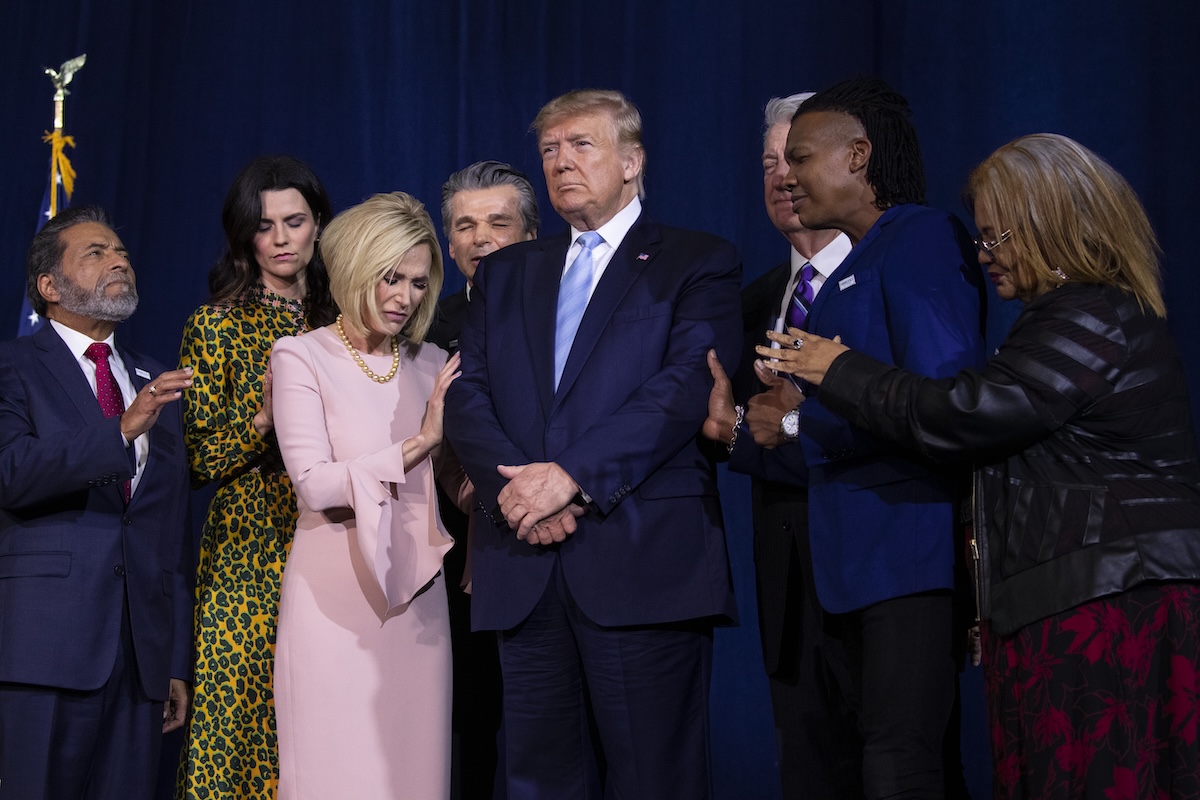Tim Alberta’s new book, The Kingdom, the Power, and the Glory: American Evangelicals in an Age of Extremism, opens with the death of his father, Richard Alberta, an evangelical minister in suburban Michigan. He died in 2019, shortly after Tim published his previous book, American Carnage: On the Front Lines of the Republican Civil War and the Rise of President Trump. Alberta flew home for the funeral while that book was still making headlines, including attracting the ire of Rush Limbaugh.
At the visitation, a number of friends, family, and church members proved more eager to cause friction over the book than share his grief. “Some of it was playful,” he writes, “… some of it was cold and confrontational. One man questioned whether I was truly a Christian. Another asked if I was still on ‘the right side.’ All while Dad was in a box a hundred feet away.” After the funeral, he discovered a letter from an elder at his dad’s church accusing him of “treason—against both God and country.”
After reading the letter, he writes, “I felt sick.” His wife, less subtle, read it and shouted, “What the hell is wrong with these people?” Alberta’s new book is an effort to answer that question. It’s the product of several years of in-depth reporting among ordinary Christians, pastors, and churches.
The Kingdom, the Power, and the Glory is the story of a shift in evangelicalism, and its central characters—the ones portrayed most sympathetically—are exasperated pastors, disillusioned institutional leaders, and weary church members. Then there’s Alberta himself, whose posture is one of curiosity, occasional amusement, and (most often) bewilderment at the spectacles on display in American evangelicalism.
Alongside these characters are the stars of the new American right—the pastors, politicians, charlatans, and grifters who have made alarmism about politics, COVID, Trump, and/or QAnon features of their ministries and platforms. Alberta does an admirable job of taking the reader past the façade of their public personas, which more often than not reveals characters who are at once more complicated and more outrageous than they first appear.
It also brings you into the lives and thoughts of the Christians in the pews, the ones changing churches because of COVID policy, concern over critical race theory (CRT), or a sense of insufficient concern by church leaders over the fate of our nation.
Alberta begins his account with the story of the rise of Jerry Falwell Sr., who comes to life like a character in a Tom Wolfe novel. Complicated, with contradictory motives—at once true believer and door-to-door salesman. Fifty years later, the eccentricities of the characters are even larger—more like characters from David Foster Wallace’s dystopian Infinite Jest than Wolfe’s Bonfire of the Vanities. At a Mike Flynn rally in 2022, Alberta finds himself marveling at characters like Mike Lindell (the “My Pillow” guy) and the OnlyFans star who was warning of the nation’s moral decline, as well as Kash Patel, the former Trump aide who was selling an allegorical children’s book about the 2020 election called The Plot Against the King. “Surely,” Alberta wonders, “… some of these folks were in on the joke.”
And of course, they were—to the extent that they could laugh, cry, and storm the U.S. Capitol all on the same afternoon. In this way, they embody the spirit of Trump, whose manner of speaking intentionally blurs all distinctions between truth, lie, insult, and joke. As Hillary Clinton infamously said of Trump in 2016, “Trump is fun,” and it is among his superpowers that he can leave you laughing and in slack-jawed disbelief at the same time. This is reflected in the communities profiled by Alberta, where the truth or fiction of any given leader’s statements are far less important than the ability to stir affections, signal loyalty, and most importantly, increase the velocity of the movement. It becomes abundantly clear in The Kingdom, the Power, and the Glory that the crackpots and grifters have established a thriving industry, and that the gravity and momentum of the evangelical movement is in their favor. The question is, What do we do about it?
Alberta doesn’t offer prescriptions so much as he does the diagnosis, leaving the reader to sort some of this out for themselves. Serendipitously, on the day that I finished the book, National Review published a piece by my friend Andrew Walker: a scathing analysis of evangelicals who have focused on the negative aspects of their movement and its alliance with the new post-Trumpian right. I think Walker illuminates the prescription needed in light of the stories Alberta tells, although he does so unintentionally. Of Alberta, Peter Wehner, David French, and their like, Walker says:
These journalists use their Evangelical credentials and powerful media platforms to scold other Evangelicals and warn of the looming threat that Evangelicalism poses to America. We are all, it seems, would-be insurrectionists more devoted to Donald Trump than to Jesus Christ. We’ve sacrificed integrity and virtue for political power. We love America more than the Kingdom of God. These journalists are the only ones with any credibility left, they imply, because they possess the integrity, rectitude, and fortitude to see through the fog of Trumpism and tribalism.
Walker admits that evangelicals have a problem with “bizarre conspiracies and suspect charlatans,” yet finds it unseemly for these journalists to use their platform “as a bludgeon to pulverize Evangelicals for their alleged sins.” He writes:
The formula is this: Imply the worst about your fellow Christians and believe secular liberals are motivated by righteousness; empathize with leftist sentiment but give no hearing to those whom elites disenfranchise; dismiss the household of faith and ratify secularist suspicion of Evangelicals. For one must never allow those in the ruling class to become uncomfortable or be told that their own godless worldview is built on sand.
Walker doesn’t provide a constructive vision for dealing with evangelicalism’s problems beyond noting that progressives are really dangerous and lots of conservatives didn’t storm the Capitol on January 6. Overall, the piece reads a bit like someone complaining that it’s inappropriate to air the dirty laundry in front of your neighbors.
Like I said, I think it’s unintentionally illuminating to Alberta’s project, and there’s more than a little irony in finding this argument in the digital pages of National Review, since the example of William F. Buckley (its founder) is one we desperately need right now. Throughout his career, Buckley had to make difficult choices for the sake of the integrity of the conservative movement. In 1957, when anti-Semitism took hold at American Mercury, a publication run by conservative fellow travelers, Buckley banned any writer that published there from appearing on the National Reviewmasthead. Similar choices had to be made about members of the John Birch Society in the 1960s. In the 1980s and ’90s, he parted ways with longtime editor Joseph Sobran and contributor Pat Buchanan over what he and others perceived to be their anti-Semitism.
Each of these decisions were consequential, agitating subscribers, donors, and contributors. Those who objected weren’t necessarily anti-Semites, radicals, and conspiracy theorists, though; rather, they were concerned about the strength of the conservative movement and the need to keep a strong coalition.
These decisions contrast starkly with the dynamics evident in the Trump years, where a “y’all come” attitude toward coalition building has made Trump slow to condemn the likes of David Duke and the Charlottesville “Unite the Right” crowd. In this environment, it’s no wonder why David Barton’s long-debunked attempts to Christianize Thomas Jefferson have thrived, or why disinformation about COVID vaccines, the 2020 election, and the war in Ukraine are so abundant. Like the gold plating on his escalator, Trump’s unwillingness to police his own movement has offered a patina of credibility to crackpots and grifters, and it’s not in the nature of extremists to moderate over time. They are, at core, ideologically driven, and ideology will always expand its scope and intensity over time.
And yet, when I read Andrew Walker’s piece about Alberta, French, and Wehner, I’ll admit that there was a small part of me that was sympathetic to the case he made. There’s something exhausting about the Trump years, and some days I don’t want to hear anything else about the QAnon Shaman, Rudy Giuliani, or Mike Flynn. But the fact is that we’re a matter of months away from the very real possibility that Trump could be our next president (again), that Flynn could be our secretary of defense, Rudy our attorney general, and the QAnon Shaman could be the next ambassador to Canada. Ignoring the extremes of this movement is simply putting your head in the sand.
Unfortunately, that’s what a lot of conservatives seem ready to do, and its why I predict Walker’s piece will be the first of many attacking books like The Kingdom, the Power, and the Glory. I sense a rising tide of angst among conservative evangelicals that were anti-Trump in 2016. They’re no more sympathetic to his boorish behavior and low character than before, but they’re embittered by the broadsides cast against evangelicals by the media, progressives, and Democrats. They’re also genuinely concerned about issues like border security, gender ideology, abortion, and the integrity of the justice system. I get that, too—and share all those concerns. When Trump seems to be the only option the conservative movement has, it’s tempting to throw your hat in with him just to feel as though you’re making a difference in reference to these other, troubling matters.
If that’s your temptation (or your choice), then Alberta’s book—like the other works Walker condemns—will be an irritant. It forces you to grapple with the ugly, downstream consequences of Trump’s “y’all come” movement. Truth telling and resisting the co-opting of the evangelical movement offers only the comforts of ruthless consistency. You can stand with Buckley on principle—making the difficult decision of rejecting today’s crackpots and grifters as conservatives have for decades—then resign yourself to the fate of being a political minority and politically homeless.
Rising extremism at both ends of the political spectrum may lead to chaos and violence in 2024, but by insisting on truth telling in a season like this, and by denying active or tacit support to a movement that undermines the integrity of the church’s witness, you gain the modest comfort of being able to watch the world burn and know that you, at least, did not light the match.

